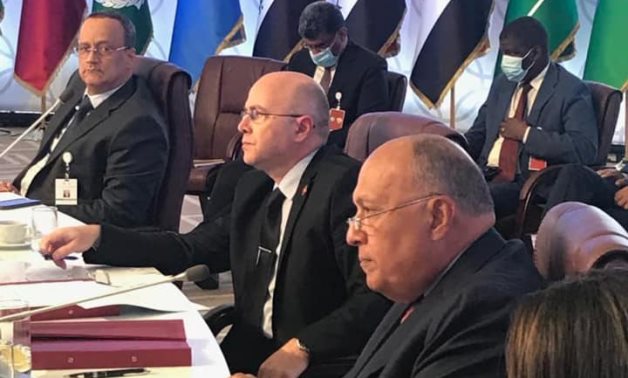
Minister of Foreign Affairs Sameh Shokry in the Arab League Extraordinary Ministerial Meeting on the Grand Ethiopian Renaissance Dam (GERD) on June 15, 2021. Press Photo
CAIRO – 15 June 2021: Minister of Foreign Affairs Sameh Shokry delivered a speech Tuesday in the Arab League Extraordinary Ministerial Meeting on the Grand Ethiopian Renaissance Dam (GERD) called for by Egypt explaining the status quo of the crisis.
The minister stressed that Egypt and Sudan have been negotiating with Ethiopia for ten years but to no avail. He asserted that Egypt have been embracing goodwill and at the same time longing for a fair legal binding agreement that would preserve Ethiopia's rights in development and the water shares of both downstream countries.
"In spite of the reasonableness of what Egypt is demanding, negotiations took countless rounds where Egypt showed flexibility reflecting eagerness to achieve balance among all aspects in a way that allows all parties to achieve part of their goals without causing harm to each other. However, the problem lies with the Ethiopian side that wants to impose its vision on the others disregarding on purpose all treaties and bills regulating trans-boundary rivers, and a fait accompli where upstream countries control downstream countries, which would never be accepted by Egypt," Shokry said.
In the meeting, Qatari Foreign Affairs Minister Mohamed bin Abdel Rahman al-Thani expressed Doha's support to the water rights of Egypt and Sudan pointing out that the filling of the Ethiopian dam has to be carried out in accordance with rules that maintain the interests of both downstream states.
The dispute among Egypt, Sudan, and Ethiopia dates back to May 2011 when Ethiopia started building the dam; Egypt voiced concern over its water share [55.5 billion cubic meters].
Three years later, a series of tripartite talks between the two countries along with Sudan began to reach an agreement, while Ethiopia continued the dam construction.
In 2015, the three countries signed the Declaration of Principles, per which the downstream countries should not be negatively affected by the construction of the dam.
In October 2019, Egypt blamed Addis Ababa for hindering a final agreement concerning a technical problem, calling for activating Article No. 10 of the Declaration of Principles, which stipulates that if the three countries could not find a solution to these disputes, they have to ask for mediation.
Washington had brokered tripartite negotiations among the three countries, in the presence of the President of the World Bank (WB) starting from November 6, 2019 until February 27 and 28, 2020.
During these rounds of talks, tangible outcomes were agreed on among the three parties concerning the rules and mechanism of operating the dam and the filling process of the reservoir during the drought and prolonged drought; however, an agreement was not sealed.
Constructions in the Grand Renaissance Dam started on April 2, 2011 at a cost of $4.8 billion. It was built by the Italian construction and engineering company Salini Impergilo. The Italian company is headquartered in Milan. The dam is located on the Blue Nile with a capacity of 74 billion cubic meters, and is expected to generate up to 6,000 megawatts of power.
The first filling was carried out in 2020 with 4.9 billion cubic meters. Currently, Ethiopia intends to do the second filling in July with at least 13.5 billion cubic meters.
Comments
Leave a Comment